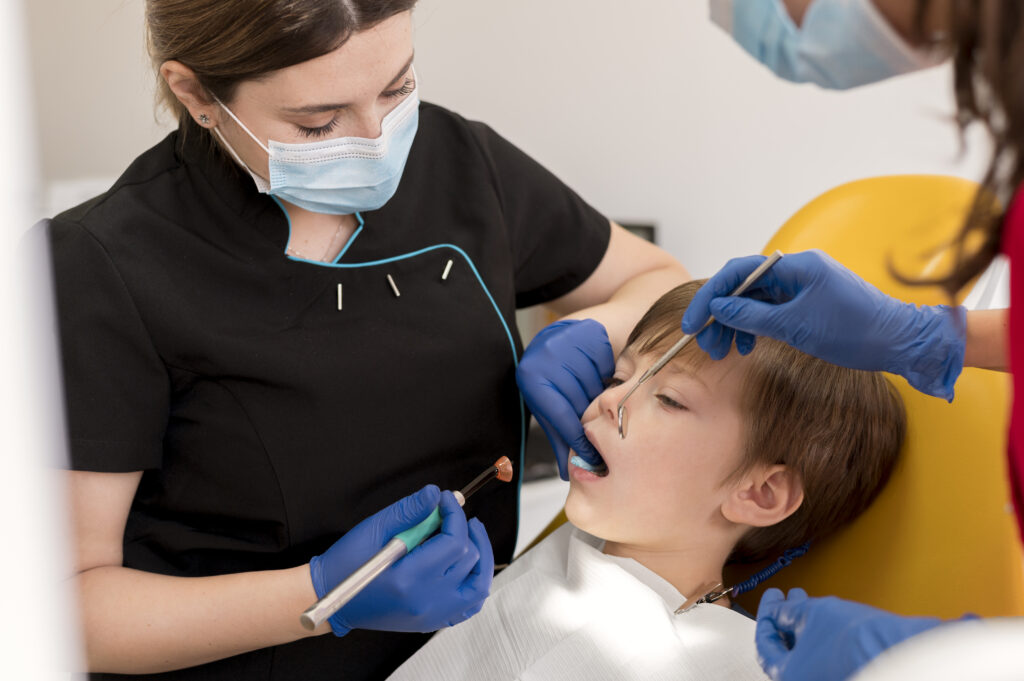
Pediatric Endodontics
Endodontics is the dental specialization that is concerned with the study and treatment of the dental pulp and the tissues surrounding the root. Endodontists focus on performing root canal treatments to clean and seal the root canal area.
Introduction to Pediatric Endodontics
Endodontic treatments carried out in children fall under the purview of pediatric endodontics. The treatments are recommended by pediatric dentists after a thorough examination to determine the root cause of the dental issue. The pediatric endodontic treatments help to relieve any pain that the child may be experiencing due to a deep cavity, a fractured tooth or any other injury to the tooth.
Importance of Early Dental Care for Children
Dental care routine for babies needs to begin even before the first tooth erupts! This is because cavities can develop almost as soon as the baby has teeth. The natural sugars present in the mother’s breast milk and in formula encourage the growth of bacteria in the mouth and can cause cavities if the residue after feeding is not cleaned with water and a soft wet cloth. The milk teeth play a crucial role in the health of the permanent teeth that he / she will have in the future so it is important not to ignore their care.
Common Dental Issues in Children
Most often, dental issues in children are due to poor oral hygiene habits, improper diet and lack of periodic monitoring. Common oral health issues seen in children include:
- Tooth Decay – when the cavities in the child’s mouth spread to the pulp of the tooth, it can cause extreme pain and infection which may necessitate the need for pupal treatments.
- Injury or Trauma – most children are curious, active and restless by nature and incidents like falls and injuries during play and other activities can cause the pulp of the tooth to experience trauma.
- Infection – Pulp infection can be extremely painful and may be accompanied by fever, and can continually impact the health of the tooth. Therefore endodontic intervention will be required to stop the spread of infection.
Benefits of Pediatric Root Canal Treatment
Since neglecting dental pulp and root canal issues in children can cause severe tooth discomfort, abscesses and even tooth loss, the pedriatric endodontist will advise treating it with an endodontic intervention.
Pulpotomy
In this procedure, the part of the pulp that is diseased or injured is removed without impacting the healthy portion of the pulp. The healthy pulp is then treated with medication that aids speedy recovery and prevents infection. The tooth is then covered with a crown so that it can resume normal functioning.
Pulpectomy
If the child’s tooth has been injured significantly or has been damaged due to disease, it cannot be preserved with a pulpotomy. Instead, a pulpectomy is conducted where the pulp and the root canal is completely removed, cleaned and filled with an antibacterial substance and covered with a crown to strengthen and safeguard the tooth.
Apexogenesis
If it is determined that it is possible to maintain the integrity of the vital pulp tissue to help in further growth of the root, the pediatric endodontist will carry out an apexogenesis procedure. Important preconditions for the procedure are that there should be no history of spontaneous pain, tooth sensitivity, haemorrhage, and the tooth should have normal radiographic appearance.
Apexification
Where the child’s permanent tooth has lost the capacity for further root development as it is nonvital or immature, the tooth is induced to form a calcified barrier at the root terminus which will lead to the closure of the root tip and there will be no further root development in terms of length or thickness. This is usually the last resort when the pulp loses its vitality.
Root Canal Treatment (RCT)
If the child has developed a pulp infection in his / her permanent tooth, a root canal treatment needs to be performed where the pulp and nerve tissue and other damaged tissues surrounding the teeth are removed before cleaning the root canal, filled with an antibacterial substance and covered with a crown.
Tips for Parents: Maintaining Children’s Oral Health
Dental health is crucial for overall health and fitness and as a parent, this is something that is a priority for every parent. Here are a few tips for maintaining your oral health till they become competent to care for it themselves.
- Start oral health care early by establishing a routine for the child.
- Guide the child on how to brush and floss in the proper manner.
- Visit the pediatric dentist for regular dental checkups every six months.
- Promote healthy eating habits and limit snacks and sugary foods
- Encourage drinking water throughout the day for proper hydration and to keep the mouth clean.



